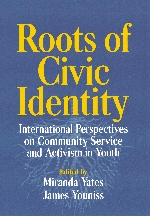Book contents
- Frontmatter
- Contents
- Preface
- List of Contributors
- Introduction: International Perspectives on the Roots of Civic Identity
- 1 Community Service and Political-Moral Discussions among Adolescents: A Study of a Mandatory School-Based Program in the United States
- 2 Social and Family Determinants of Community Service Involvement in Canadian Youth
- 3 Exploring Adolescent Altruism: British Young People's Involvement in Voluntary Work and Campaigning
- 4 Youth, Solidarity, and Civic Commitment in Italy: An Analysis of the Personal and Social Characteristics of Volunteers and Their Organizations
- 5 Political Socialization in the New States of Germany
- 6 Community Service and Social Cognitive Development in German Adolescents
- 7 Adolescents and the “Social Contract”: Developmental Roots of Citizenship in Seven Countries
- 8 Political Socialization in a Divided Society: The Case of Northern Ireland
- 9 Youth Experience in the Palestinian Intifada: A Case Study in Intensity, Complexity, Paradox, and Competence
- 10 Beyond the Call of Duty: The Service of Israeli Youth in Military and Civic Contexts
- 11 Recent Trends in Civic Engagement among Japanese Youth
- 12 Learning Politics in the Crucible: The Socialization of Taiwan High School Students as Citizens in a New Democracy
- Conclusion: Transcending Themes
- Author Index
- Subject Index
7 - Adolescents and the “Social Contract”: Developmental Roots of Citizenship in Seven Countries
Published online by Cambridge University Press: 04 August 2010
- Frontmatter
- Contents
- Preface
- List of Contributors
- Introduction: International Perspectives on the Roots of Civic Identity
- 1 Community Service and Political-Moral Discussions among Adolescents: A Study of a Mandatory School-Based Program in the United States
- 2 Social and Family Determinants of Community Service Involvement in Canadian Youth
- 3 Exploring Adolescent Altruism: British Young People's Involvement in Voluntary Work and Campaigning
- 4 Youth, Solidarity, and Civic Commitment in Italy: An Analysis of the Personal and Social Characteristics of Volunteers and Their Organizations
- 5 Political Socialization in the New States of Germany
- 6 Community Service and Social Cognitive Development in German Adolescents
- 7 Adolescents and the “Social Contract”: Developmental Roots of Citizenship in Seven Countries
- 8 Political Socialization in a Divided Society: The Case of Northern Ireland
- 9 Youth Experience in the Palestinian Intifada: A Case Study in Intensity, Complexity, Paradox, and Competence
- 10 Beyond the Call of Duty: The Service of Israeli Youth in Military and Civic Contexts
- 11 Recent Trends in Civic Engagement among Japanese Youth
- 12 Learning Politics in the Crucible: The Socialization of Taiwan High School Students as Citizens in a New Democracy
- Conclusion: Transcending Themes
- Author Index
- Subject Index
Summary
Genuine politics – politics worthy of the name, and the only politics I am willing to devote myself to – is simply a matter of serving those around us: serving the community, and serving those who will come after us. Its deepest roots are moral because it is a responsibility, expressed through action, to and for the whole.
(V. Havel, 1992)According to Walzer (1989), “a citizen is, most simply, a member of a political community, entitled to whatever prerogatives and encumbered with whatever responsibilities are attached to membership. The word comes to us from the Latin civis; the Greek equivalent is polites, member of the polis, from which comes our political” (p. 211). Becoming a citizen, assuming the rights and responsibilities of membership in a social group, is a marker of attaining adult status in many societies. But what prepares people to assume those responsibilities? How do they come to understand and exercise their civic rights? What motivates them to become engaged in civil society?
The project discussed in this chapter, Adolescents’ Interpretation of the “Social Contract,” addresses such issues. We focus on the roots of citizenship and ways that young people develop a commitment to the commonwealth. By the social contract we refer to the set of mutual rights and obligations binding citizens with their polity. We contend that there is an intergenerational bargain implied in the process of social integration, that is, a promise that one will enjoy the rights and reap the benefits of the social order if s/he lives by its rules and fulfills the responsibilities of membership. Of course, social change upsets the conditions of the bargain.
- Type
- Chapter
- Information
- Roots of Civic IdentityInternational Perspectives on Community Service and Activism in Youth, pp. 135 - 155Publisher: Cambridge University PressPrint publication year: 1998
- 14
- Cited by

